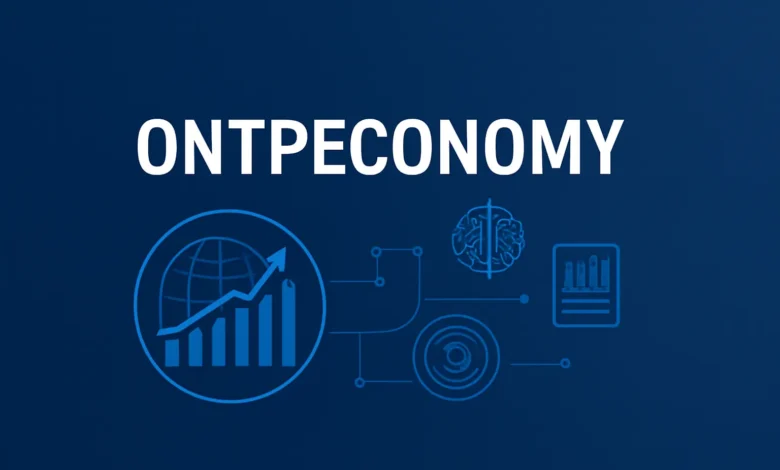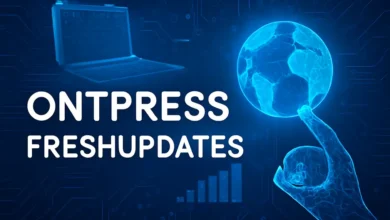Understanding Ontpeconomy: A New Era in Economic Models

The world of economics is constantly evolving. As new technologies, markets, and global influences emerge, so too must the models we use to understand and predict economic systems. One of the more recent innovations in this space is ontpeconomy. While this may sound like a complex term, it’s actually a fascinating development that brings a unique perspective to the way we look at economies in the digital age. In this article, we’ll dive deep into the concept of ontpeconomy, its key features, and why it’s a game-changer for future economic studies.
What is Ontpeconomy?
At its core, ontpeconomy is an economic framework that integrates advanced concepts of ontology (the study of being and existence) with traditional economic principles. The term itself is a fusion of “ontology” and “economy,” suggesting a new way of thinking about how economic structures exist, function, and evolve in an increasingly digital world.
In the past, economists primarily focused on measurable variables like production, consumption, and distribution to understand economies. However, as technology advanced, so did the complexity of economic relationships. This is where ontpeconomy comes in. It offers a model that considers both the tangible and intangible aspects of the economy, factoring in things like data flows, digital assets, and the role of artificial intelligence in economic activities.
The Roots of Ontpeconomy: Ontology Meets Economics
To understand ontpeconomy, we first need to take a step back and explore the concept of ontology. In philosophy, ontology concerns itself with the nature of being—what exists and how we categorize those things. When applied to economics, ontology can be seen as a way to define and structure the various components of an economy, from resources and products to services and even ideas.
In traditional economics, we look at the flow of goods and services, but in ontpeconomy, we take it a step further. It considers how economic agents (individuals, businesses, governments, and AI systems) interact in a world where intangible assets, like data and intellectual property, hold significant value. By applying ontological thinking, it helps us better understand the increasingly complex web of relationships between these economic agents and how they shape markets.
One key aspect of this new model is the ability to integrate both physical and digital economies. For instance, the rise of cryptocurrency, digital products, and blockchain technology has drastically altered the way we think about money, value, and transactions. Ontpeconomy provides a framework for understanding these digital assets as legitimate components of the economy, something that traditional economic models might overlook.
Key Features of Ontpeconomy
Digital Economy Integration
The digital transformation is one of the most significant economic shifts of the 21st century. With the rise of AI, blockchain, and cryptocurrency, digital transactions have become as commonplace as traditional ones. Ontpeconomy takes this transformation into account by providing a structure for understanding digital assets, cryptocurrencies, NFTs (Non-Fungible Tokens), and other online commodities as part of the overall economy. This integration helps bridge the gap between traditional economic principles and the emerging digital landscape.
Data as an Asset
In ontpeconomy, data is not just information; it’s a valuable asset. From tracking consumer behavior to understanding the intricacies of supply and demand, data plays an essential role in economic decision-making. In fact, many modern businesses, particularly in sectors like tech and finance, are built around data. Through this, we can quantify and monetize data, transforming it into a crucial economic resource. This is a departure from traditional economics, where data was often considered peripheral to the main concerns of production and consumption.
Artificial Intelligence and Automation
AI and automation are reshaping industries around the world, from manufacturing to customer service. Ontpeconomy accounts for the economic implications of AI systems that now play a critical role in production, consumption, and even policy decisions. In traditional models, the labor force was primarily human, but in the age of ontpeconomy, AI is considered an active agent in the economy. This shift necessitates a rethinking of labor markets, wages, and productivity, as AI-driven systems can outperform human workers in many domains.
How Ontpeconomy Impacts Traditional Economic Systems
While ontpeconomy is an innovative model, it doesn’t entirely replace traditional economic theories; instead, it complements them. it offers a more comprehensive understanding of modern economies, which increasingly operate in hybrid environments where digital and physical goods are interlinked. By focusing on both the tangible and intangible, this model can address the growing challenges of today’s interconnected world.
For instance, let’s look at how ontpeconomy might transform our understanding of global trade. Traditional models focus on physical goods, like cars, electronics, and food, moving across borders. Ontpeconomy, however, would also consider the trade of data, digital services, and intellectual property. It could even account for the way AI systems collaborate across borders to create value, adding a new layer to the traditional models of international economics.
This hybrid model also helps us deal with global challenges like climate change and economic inequality. By incorporating intangible factors, such as the environmental impact of digital infrastructure, ontpeconomy provides a framework for creating sustainable, equitable solutions. The use of blockchain, for instance, can promote transparency in the supply chain, helping to address environmental concerns and corporate responsibility.
The Role of Ontpeconomy in Future Economic Development
Looking ahead, ontpeconomy holds great promise in reshaping the future of global economies. As more sectors move toward digitalization, the relevance of traditional economic models will diminish. Instead, we’ll see a more integrated approach where it helps us navigate the complexities of a rapidly evolving market. This framework will allow governments, businesses, and individuals to make informed decisions that are based on a more holistic view of the economy.
Moreover, ontpeconomy will enable better policy-making. Governments will need to adapt to the realities of digital and data-driven economies. The economic policies of the future will need to account for things like digital currency regulations, data privacy laws, and the ethical considerations of AI and automation. Ontpeconomy provides a platform for addressing these challenges head-on, creating new economic models that are more adaptable and sustainable in a digital-first world.
Challenges and Criticisms of Ontpeconomy
While ontpeconomy is an exciting development, it’s not without its challenges. One of the primary concerns is that the integration of complex digital and intangible assets into economic models may be too abstract for some to fully grasp. Traditional economists may struggle to embrace this new model, as it requires a shift in thinking about what constitutes economic value.
Additionally, the rapid pace of technological change means that ontpeconomy will need to constantly evolve. New technologies, like quantum computing or advanced AI, could fundamentally change the way we understand the relationship between the digital and physical economies. This could make it difficult for ontpeconomy to keep pace with the innovations it seeks to describe.
There’s also the issue of ethical and privacy concerns. As ontpeconomy relies heavily on data and AI, questions about surveillance, data ownership, and consent will need to be addressed. Without proper regulations, there’s a risk of exploitation, especially in countries with weaker data protection laws.
Conclusion: The Future of Ontpeconomy
Ontpeconomy represents a bold new direction in the field of economics. By incorporating elements of ontology and focusing on both the tangible and intangible aspects of the economy, it offers a more complete framework for understanding modern economic systems. As we continue to embrace digital technologies, data, and AI, ontpeconomy will play a crucial role in shaping the economic policies and practices of the future.
Despite its challenges, the potential of ontpeconomy to provide more inclusive, transparent, and sustainable solutions is undeniable. As businesses, governments, and individuals continue to navigate the complexities of the digital age, the insights provided by this model will help ensure that we stay ahead of the curve in a rapidly changing economic landscape.



